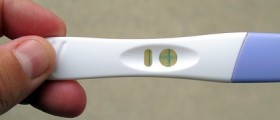
Progesterone is a steroid hormone that plays an important role in the female menstrual cycle, pregnancy and development of a human embryo. This hormone is a member of a class of hormones called progestogens. In humans, the ovaries and adrenal glands produce this hormone. Perhaps the most prominent role of progesterone is to prepare the lining of the uterus to receive a fertilized egg. If the pregnancy does not occur, estrogen and progesterone levels drop, the endometrium breaks down and menstruation occurs. If a pregnancy occurs, progesterone is produced in the placenta, and levels remain elevated throughout the pregnancy. Without this hormone, pregnancy would be impossible. Any kind of deficiency in progesterone levels may completely obstruct the conception and have negative effects on pregnancy.
Causes of low progesterone
In women, progesterone levels are normally low during the preovulatory phase of the menstrual cycle, they rise after the ovulation, and are high during the luteal phase. Sometimes the body does not produce enough progesterone to maintain a pregnancy. This usually occurs when either the follicle that develops the mature egg or the corpus luteum fails to develop properly. Primary ovarian insufficiency occurs when the ovaries fail to produce normal levels of reproductive hormones. This may happen due to various factors, ranging from genetics to autoimmune diseases.
Women may start experiencing the symptoms of low progesterone in the beginning stage of menopause, known as perimenopause. The natural shutting down of ovaries, which happens with aging, causes a reduction in progesterone levels. The ovaries start making less estrogen and progesterone, the hormones that regulate the menstruation. Removal of the ovaries, due to some other underlying condition, will make the same effect. Hot flashes are usually most indicative of decreased estrogen during perimenopause. Excessive and unmanaged stress over a long period can also severely disturb normal hormonal levels.
Symptoms of low progesterone
Low progesterone levels manifest in a series of highly uncomfortable symptoms such as: insomnia, dizziness, irritability, difficulty concentrating, intense mood swings, bloating, weight gain, muscle pain, joint pain and urinary incontinence. Other signs of low progesterone include frequent urinary tract infections, interstitial cystitis, changes in appetite, hot flashes, cold chills, night sweats and vaginal dryness.
Treatment for low progesterone
A simple blood test can determine if a woman suffers from low progesterone levels. Treatment is relatively easy and successful, and combines lifestyle moderations and prescribed medications. Simple lifestyle changes include avoiding caffeine and alcohol, getting enough quality sleep, eating a well balanced diet, many vitamins, staying hydrated, and practicing regular physical exercise. Women are often prescribed progestin, a hormonal substitute for progesterone. This substitute regulates the menstrual cycles and builds up the lining of the uterus to help maintain pregnancy.












-Why-Some-Women-Take-This-Type-Of-Progesterone-During-Early-Pregnancy_f_280x120.jpg)



Your thoughts on this
Loading...